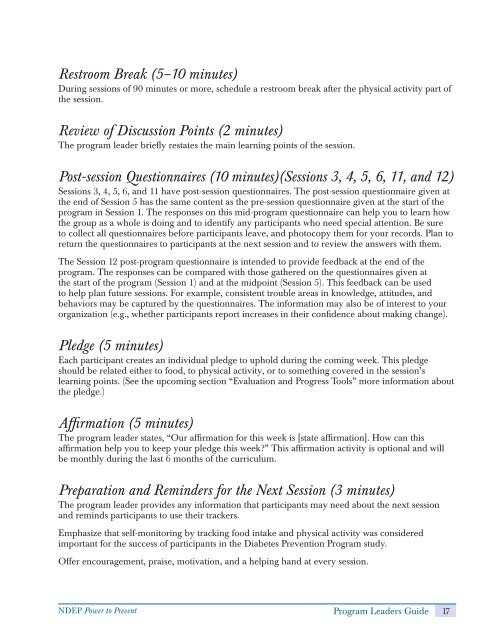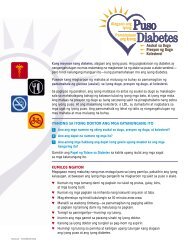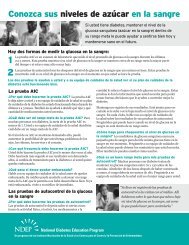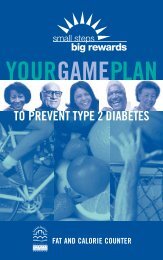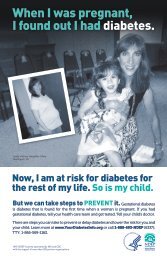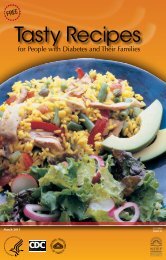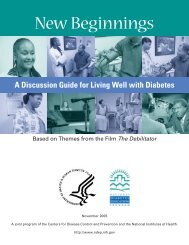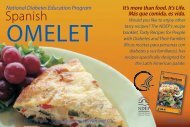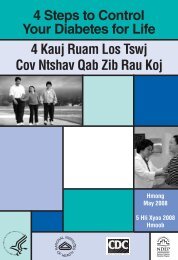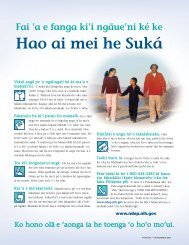Power to Prevent - National Diabetes Education Program - National ...
Power to Prevent - National Diabetes Education Program - National ...
Power to Prevent - National Diabetes Education Program - National ...
Create successful ePaper yourself
Turn your PDF publications into a flip-book with our unique Google optimized e-Paper software.
Restroom Break (5–10 minutes)<br />
During sessions of 90 minutes or more, schedule a restroom break after the physical activity part of<br />
the session.<br />
Review of Discussion Points (2 minutes)<br />
The program leader briefy restates the main learning points of the session.<br />
Post-session Questionnaires (10 minutes)(Sessions 3, 4, 5, 6, 11, and 12)<br />
Sessions 3, 4, 5, 6, and have post-session questionnaires. The post-session questionnaire given at<br />
the end of Session 5 has the same content as the pre-session questionnaire given at the start of the<br />
program in Session . The responses on this mid-program questionnaire can help you <strong>to</strong> learn how<br />
the group as a whole is doing and <strong>to</strong> identify any participants who need special attention. Be sure<br />
<strong>to</strong> collect all questionnaires before participants leave, and pho<strong>to</strong>copy them for your records. Plan <strong>to</strong><br />
return the questionnaires <strong>to</strong> participants at the next session and <strong>to</strong> review the answers with them.<br />
The Session 2 post-program questionnaire is intended <strong>to</strong> provide feedback at the end of the<br />
program. The responses can be compared with those gathered on the questionnaires given at<br />
the start of the program (Session ) and at the midpoint (Session 5). This feedback can be used<br />
<strong>to</strong> help plan future sessions. For example, consistent trouble areas in knowledge, attitudes, and<br />
behaviors may be captured by the questionnaires. The information may also be of interest <strong>to</strong> your<br />
organization (e.g., whether participants report increases in their confdence about making change).<br />
Pledge (5 minutes)<br />
Each participant creates an individual pledge <strong>to</strong> uphold during the coming week. This pledge<br />
should be related either <strong>to</strong> food, <strong>to</strong> physical activity, or <strong>to</strong> something covered in the session’s<br />
learning points. (See the upcoming section “Evaluation and Progress Tools” more information about<br />
the pledge.)<br />
Affrmation (5 minutes)<br />
The program leader states, “Our affrmation for this week is [state affrmation]. How can this<br />
affrmation help you <strong>to</strong> keep your pledge this week?” This affrmation activity is optional and will<br />
be monthly during the last 6 months of the curriculum.<br />
Preparation and Reminders for the Next Session (3 minutes)<br />
The program leader provides any information that participants may need about the next session<br />
and reminds participants <strong>to</strong> use their trackers.<br />
Emphasize that self-moni<strong>to</strong>ring by tracking food intake and physical activity was considered<br />
important for the success of participants in the <strong>Diabetes</strong> <strong>Prevent</strong>ion <strong>Program</strong> study.<br />
Offer encouragement, praise, motivation, and a helping hand at every session.<br />
NDEP <strong>Power</strong> <strong>to</strong> <strong>Prevent</strong> <strong>Program</strong> Leaders Guide 7


